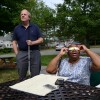Let’s face it — a royal wedding is the original fairy tale. And for the millions of American girls fed adolescent diets of Disney princesses and happily ever after stories, the wedding of Prince Harry and American Meghan Markle is a virtual feast. Now I won’t be one of the sleepy eyed rising in the wee hours of Saturday morning to watch the pageantry. But real talk as the kids say, I will fire up the DVR to record every minute of pomp and circumstance. I’m fascinated because this royal trip down the aisle is much more than a sugary buffet of romantic hearts and flowers.
By now you’ve probably heard that bride-to-be Meghan Markle, an American actress best known for the TV series, Suits, has a black mother and white father. That makes her black to a lot of African-Americans, mixed race to others. However you define her racial history, her engagement to Harry prompted racist commentary from some British tabloids. Prince Harry complained about the “racial undertones” of some coverage, including nasty headlines like “Harry’s Girl is (Almost) Straight Outta Compton.” Meghan’s race upsets some because she interrupts the pure Anglo — read white — blood lines of the royals. A 2017 article in The Guardian newspaper notes, “The obsession with lines and blood is often couched in notions of racial superiority.” And Kehinde Andrews, associate professor of sociology at Birmingham City University, told Newsweek, “The family is really strongly a symbol of British empire whiteness.”
Meghan, however, is not the first black royal. She notably follows Queen Charlotte, German wife of King George III, called Britain’s first black queen. Frontline researcher and historian Mario Valdes says Charlotte descended from a Portuguese noblewoman. The product of a 13th century king and his mistress Madragana, assumed to be a Moor like Shakespeare’s fictional Othello. Her broad nose and curly hair drew comment at the time; she was described as “black” and “ugly.” Queen Charlotte birthed 15 children for King Charles so presumably the infiltration of the heretofore-pure royal line occurred centuries before Meghan showed up. North Carolina’s Charlotte, known as the Queen City, is the Queen’s namesake, as is Charlottesville, Virgina, ironically the scene of last year’s racist tiki torch march.
I’m delighted that the focus on Harry’s fiancée has brought renewed attention to Queen Charlotte’s story. I’ve learned she was 17 when she married King George, something not unusual for her time. Meaghan’s age, on the other hand, has drawn a number of snarky remarks. I’ve yet to read a story that doesn’t mention her age — as in “at 36 Meghan Markle is the oldest royal bride, and three years older than Prince Harry.”
Because Harry is now sixth in line for the throne, his bride will likely be a duchess not a princess, but that hasn’t dimmed American royal fever. Especially among some African-American women who see Meghan as a real life black princess. Girl Tyler is now merchandising tee shirts with her catchphrase, “We got us a Black Princess Y’all.”
When Meghan Markle walks down the aisle in St. George’s Chapel at Windsor Castle, she will honor centuries old traditions and mark a new chapter in British royal history. Six hundred guests, many of them from local charities, will bear witness inside the historic chapel. And along with the millions of us around the world, I like to think that Queen Charlotte, too, will be wishing them well.
This article has been updated.





